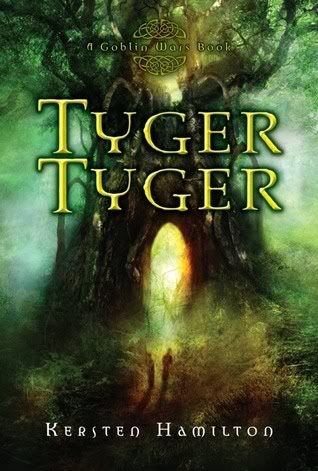This is another book which was recommended to me from The Enchanted Inkpot (well, I believe so, when I went to delete it off of my "to-read" list it was rather high up on it so I've had the recommendation for a while). Not much else to say about it, except from the title I was expecting it to be a book dealing with an Indian setting/mythology (or maybe even something dealing with the British in colonial India) but apparently I was thinking of the wrong country that starts with the letter "I".
Tyger Tyger by Kersten Hamilton
While the cover of the book makes sense (I'm assuming this is an image of the entrance into Mag Mell) the title doesn't make much sense to me. The poem "Tyger Tyger" is only mentioned twice throughout the entire book and doesn't have a lot of special meaning either time, it's a strange name for a book.
Summary: Teagan lived a happy life with her family, a normal life, but when they take in her cousin Finn strange things, things from fairy tales and her mother's past, begin to happen and Teagan has to go on a journey to salvage what parts of her life she's left with.
The Good: It was a nice surprise to learn that Finn was not a "bad boy" or even a "jerk with a heart of gold" character (as his status as the love interest would initially suggest) but it actually a nice guy and doesn't try to hide it. The revelations about Teagan's family was a nice twist but had enough foreshadowing that it doesn't jerk the reader out of the story or feel unbelievable and it also explains a few things.
The Bad: One problem with kind of setting is that, well, it doesn't make a lot of sense. Once the lead character learns how to see the supernatural they see tons of creatures everywhere causing tons of trouble and, more likely than not, killing people. So, why aren't there more unexplained deaths in these settings or a more superstitious public? The setting isn't just a backdrop for the characters to act against, it's something that should motivate and interact with them and, in this case and like so many others, it just doesn't work the way it should. Other complaints include that the characters actions don't always make sense (why are they even trying to enter Mag Mell if they know that they shouldn't be able to get in? Do they only do this so that they can show later that they can and that there is something going on that they don't know about?) and the relationship between Finn and Teagan ends on a rather weird note (due in part to Teagan having a sudden bout of insecurity about herself*).
The book is set to be the first in a series (don't know how many books) but honestly I don't feel an urge to read the next books, partially because it works really well as a self-contained story. Just take out the last few lines and there's no sequel hook at all, but it's also because for me this was only an okay book. Alright but not fantastic, if my grumbling over certain tropes hadn't already clued you into that, and with that, I'll be back Sunday with a new review folks, see you then!
*bit of a spoiler here but that's why this is in a footnote. One trope I really don't like these days is when the protagonist finds out that they're not quite human/not all human/not human at all and breaks down having an existentialist crisis because of it. It's perfectly understandable that a character would be thrown by the revelation and confused but when they start questioning everything about themselves, everything they've ever thought or done, because of this one thing, that's when it gets annoying. This applies to many other characters as well by the way but, it seems stupid for them to think that they're a different person just because they know more about themselves, they still have the same thoughts, emotions, feelings, hopes, desires, ect after all don't they? Just wanted to get that rant out, the tomato in the mirror trope is being used a lot these days and that part of the trope just bothers me every time it comes up.
